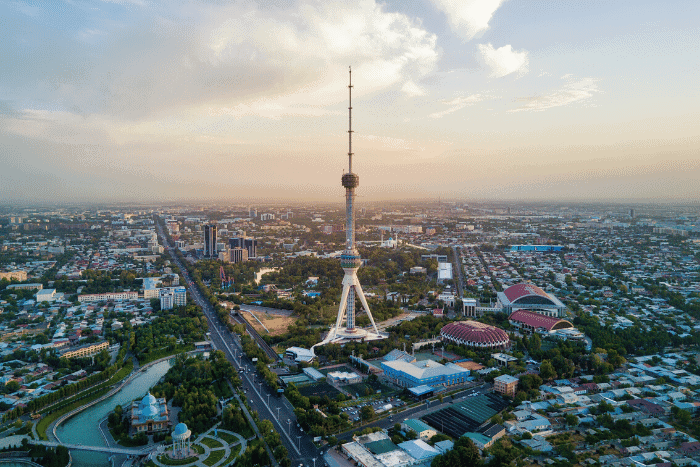Cheap Real Estate: Where are the Best Investments Overseas?
April 5, 2024
Dateline: Kuala Lumpur, Malaysia
If you’re looking to invest in foreign real estate, it’s tempting to do things like type “free” or “cheap real estate” in your favorite web browser and see what comes up.
Maybe you’re looking into international real estate for the first time, maybe you’re just tired of overpaying for real estate back home.
Either way, there are numerous benefits to owning foreign real estate.
When successfully worked into your offshore strategy, foreign real estate can earn you higher returns, protect your assets, benefit your tax strategy, diversify your life, and even protect you from instability at home.
However, if you go about it the wrong way and overspend you could end up paying more than you benefit.
So, which cities in the world have the cheapest real estate for investment?
My R&D team and I have been working on this question for the last year alongside our friends at InvestAsian to figure out where you can find ultra cheap property prices for investment in emerging and frontier markets.
In this article, we’ll cover the criteria we used in our search to find the best properties and give you suggestions on where you can begin your own.
What Cheap Real Estate Looks Like
When we tell people to go where they’re treated best, that doesn’t just mean parking your cash in a stable place like Singapore. It also means going to the other end of that spectrum and finding where you can buy properties and invest capital so that you can earn excellent returns.
As far as Singapore goes, if you had bought real estate there several decades ago, you could be fabulously wealthy today. That isn’t the case anymore, but there are other places with potential out in the world.
Our working definition of cheap real estate is any cost under $1,000 per square meter ($91 per square foot) that you can find in the city center of a capital or business city.
Why capital cities?
What I’ve learned over my years of traveling and talking to investors around the world is that, while it might not be true in places like the US, UK, or Australia, in most emerging countries you want to buy in the capital city.
The capital city is where people are moving and things are flourishing.
There are a few exceptions, namely when the business capital of the country is different from its political capital. In most countries, however, you want to be in the capital.
You don’t want to buy property in the suburbs or some second-tier city. Aim to be in the core area.
Now, before we jump into the best cities for investing in cheap real estate, let’s compare some prices to better understand the $1000 threshold and where you’re going to find it.
There are many places in the developed world that meet this standard. There are even parts of Cleveland, Ohio, where I grew up, that meet this criterion. The average property value there is sitting somewhere around $900 per square meter.
On the other side of this price spectrum in the United States is Los Angeles where you’re going to be looking at an average of $7,000 per square meter. There are some parts of Los Angeles where that price is going to be tripled or quadrupled.
If you go to Hong Kong – generally accepted as the most expensive property market in the world – you’ll find property values at a hefty $29,000 per square meter.
With Hong Kong as our high-end for property prices, it should make sense why we’re focusing on $1,000 or less.
You can find these prices in countries that have been beaten down. Countries like Colombia that people avoid because of false beliefs or bad reputations. You’ll also find these prices in countries with smaller domestic economies that not many people have heard of.
Just remember, “cheap real estate” does not mean the “best real estate.”
The countries I’m going to mention here may be great options for your offshore strategy. Any one of them might also be a terrible idea for your personal situation. The offshore world is a complicated place where there really is no one best country for real estate investment.
You can, however, figure out what places will work best for you by asking yourself what it is you want to do and creating a plan that will help you do it.
If you want more information on how to determine the best country for real estate investment for you, you can check out this article.
With that in mind, let’s start into the list.
Cambodia

One of the places I’ve talked about a lot over the last few years that still meets these criteria is Phnom Penh, the capital of Cambodia.
Phnom Penh is a city on the rise with all kinds of opportunities for business and real estate investment. The Cambodian government is out to bring in foreign investment of any kind to help build its economy. This makes it a great place not only to buy real estate but to do business as well.
About four years ago, I talked about the 50/20/100 model in Cambodia where you could buy a property in the city center for $50,000, renovate it for $20,000, and then be able to sell it for $100,000. Since then, those numbers have changed a little bit.
Yields have been squeezed as prices have gone up, particularly as developers have come in to build skyscrapers and malls. Every time I go to Phnom Penh there seems to be a flurry of new activity.
Despite all this activity, $1,000 a meter in the core is still doable. You’ll be able to find plenty of places where you can invest. I was looking recently at a small apartment right down the street from the Royal Palace. It was a prime location that needed a bit of work and came out to be around $900 per square meter.
Overall, Cambodia is still a great place to invest.
Georgia
The Balkans and Central Asia are some of the most misunderstood or just plain unknown regions of the world, which makes them excellent opportunities for investment.
Number one in these regions is Tbilisi, Georgia. I talk about Georgia a lot here on the website and on YouTube, so if you’re a frequent reader this shouldn’t be a surprise.
Georgia has a very pro-business government, making the country a good place to add to your offshore strategy for a variety of different reasons.
Because of an influx of business to the country and good economic policies, the Georgian economy is steadily growing. While you might not be able to find properties that fit our criteria in nearby cities like Yerevan or Baku, Tbilisi is lagging slightly behind them, which translates into lower real estate prices overall.
Property prices may tip over the $1,000 mark in the future, but it’s still possible to find ultra-cheap, amazing properties close to Tbilisi’s center.
I’ve seen deals creeping up in the last four years, but I’ve bought properties there for $430 or $510 per square meter. And I recently did a deal on a prime location for about $1100 a meter that I now use as my home.
You might not find many properties in the ultra-cheap range that are renovated to your standards, but the opportunity is there.
Moldova
In the same region as Georgia is Chișinău, Moldova.
If you’ve been reading about Moldova, you might have heard that they recently announced a citizenship by investment program. Depending on your situation, that might be a good option to explore.
However, buying ultra-cheap properties isn’t going to do much to help you meet the requirements of the program.
In the past, Moldova was known as a country where you could get very high yields on real estate. The challenge with this country that makes it harder to work with than Georgia is that there isn’t much domestic demand for real estate.
People aren’t coming into Moldova, they’re leaving.
Many Moldovans are trying to get their Romania passports and leave the country which makes the benefit of buying real estate there a little harder to understand.
That being said, you can buy for less than $1,000 per square meter.
Moldova is a beautiful country that grants you access to a European lifestyle. It could be a great opportunity for people looking for somewhere to retire or as a place to lower your cost of living.
However, it’s not the best option if you’re focused on your ROI.
Kyrgyzstan and Uzbekistan

On the Central Asia side of things, two capital cities that stick out are Bishkek in Kyrgyzstan and Tashkent in Uzbekistan.
You’ll be able to find ultra-cheap properties in both Bishkek and Tashkent, and Kazakhstan is a place that many people who are investing in emerging markets are focused on.
The problem and opportunity for these two countries is that many people just don’t know anything about them.
While both Kazakhstan and Uzbekistan have been slow to recover from their Soviet days, they’re becoming more open to foreigners and foreign investment.
Pro-business government policies have opened up a future of opportunities. Uzbekistan is behind Kazakhstan, but it has the potential to become just as interesting in the future.
Both of these countries will have a different audience. They’ll require more work than places like Georgia, but they’re worth watching.
If you have a strong stomach and you’re willing to put the time in on the ground before anyone else does, you could see great things happen.
Egypt, Pakistan, and Tunisia
The Middle East and North Africa are regions of the world that you’ll also need a strong stomach to get involved in as an investor.
That said, there are three capital cities where you’ll be able to find ultra-cheap property: Cairo in Egypt, Islamabad in Pakistan, and Tunis in Tunisia. All three capitals boast affordable real estate in the city core.
The main problem is stability. especially in Pakistan where there isn’t much promise for the political or economic situation to become more stable in the coming years.
I was talking to one of my Egyptian friends about opportunities for real estate investment in Alexandria. There’s plenty of cheap options there as well as in Cairo, but issues with tourism and the Eygptian pound alongside other structural problems have not helped make the place an attractive country to explore for investment.
Tunisia has been an interesting choice for digital nomads in the past and could have some advantages when it comes to jumping into the real estate market. It’s more stable than its neighbors and is in close proximity to Europe.
All have the ultra-cheap real estate we’re looking for but just won’t work for many people looking to get into foreign real estate investment.
Dip Your Toe In With Cheap Real Estate

If you have not heard of the countries on this list, it may be difficult to determine how you feel about them, let alone how they might fit into your real estate investment strategy.
As I’ve traveled over the last decade or so, I’ve been able to put more “names to faces” when it comes to these countries. It’s become easier to dip my toe in and find the opportunities that exist in each place I visit.
I’ve talked about Cambodia and Georgia for a while. If you’re a frequent reader, you might feel more comfortable with them. I’ve bumped into people on the street in Tbilisi who’ve told me that they’re there because they read one of my articles or videos and decided to check it out.
Maybe you aren’t comfortable getting into some of these cities now. Maybe you don’t know enough to feel like you can start investing. If you aren’t ready, what you can do instead is to see if you can get into the country and open a bank account.
Just go dip your toe in.
Acclimate yourself to these countries by spending time in them. Put $5,000 in a Georgian bank and spend six months getting to know the country and your situation before you worry about investing. If buying cheap real estate is what you want to get into, do what you can to get comfortable.
But the best time to start is now.
There is certainly going to be the risk that something will happen politically to upend the situation, but that same risk exists everywhere.
The risk that political or economic changes could negatively impact the market is something that needs to be considered even in stable countries like the United States.
If you really want to take advantage of these markets, the prices you’ll find now are the cheapest you’ll find in the world. They are about as good as it gets.
Long-Term Real Estate Investments
In terms of asset allocation, foreign real estate is your long-term investment; a call option to a certain extent.
Some of these countries may not take off and could languish. Moldova may just be flat for a while, a place where you can collect rent but not really see growth. Other markets will grow in a big way that will make the investment more than worthwhile.
If you look for past examples, you’ll find more than Singapore. Turkey has gone up to $2000 or $3000 per square meter. Thailand used to be a place to think about but has become much more expensive.
So, this is your long-term gamble on places that could see an increase in value if everything continues to go well.
But, you’re going to need to put in the effort now. You’ll need to work with someone who knows what they’re doing or someone already on the ground in the country who can show you what to do and where to go.
If you can’t find someone like that, you need to become that person and spend the time on the ground yourself.
Finding profitable, cheap real estate is going to take more than going online and searching for good deals in Tashkent. Going where you’re treated best for real estate is going to take much more than that.
If you want my team and me to assess your personal situation, recommend ideal locations for you, network with our contacts in these locations on your behalf, and help you implement a holistic offshore strategy, you can always apply for a one-on-one Strategy Call.
After all, we’ve already done most of the work for you.


Is Land Investment Safer?
When American humorist and writer Mark Twain said, ’Buy land, they’re not making it anymore,’ he was definitely on to something. Land is finite, and that scarcity gives it lasting appeal. Yet, despite its obvious logic, land remains one of the most misunderstood investments. Many people are put off by its perceived complexity, potential legal […]
Read more

Top Emerging Market Economies for US Investors in 2025
If you’re still parking all your capital in overvalued US real estate or clinging to tech stocks in the S&P 500, you’re playing an old game while rivals are redesigning the board. The world has move on. Smart investors know that the biggest returns aren’t coming from Wall Street anymore – they’re coming from below-the-radar […]
Read more

Capital Gains Tax on Real Estate in the United States
For most people, buying a home is the single largest financial commitment they’ll ever make – and often, one of the most stressful. Yet, for many US citizens, home ownership remains a cornerstone of the American Dream. Whether it’s about financial security, independence or building generational wealth, millions strive to get on the first rung […]
Read more





